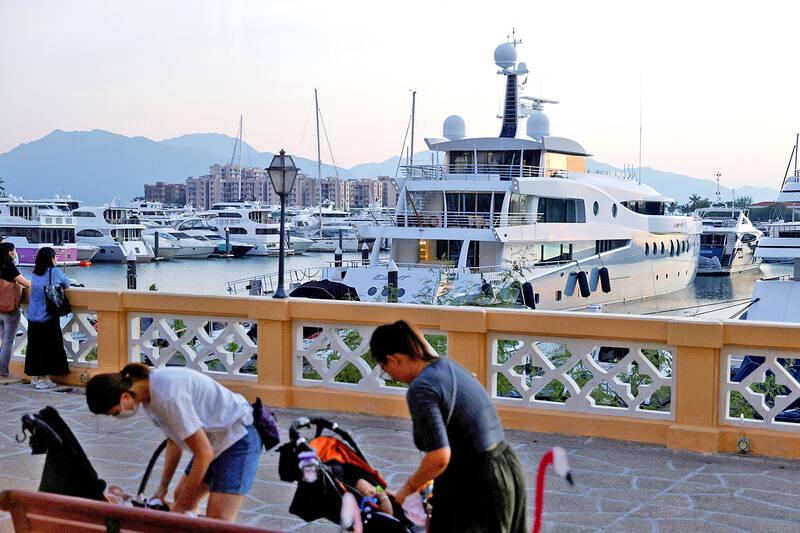China Evergrande Group (恆大集團) sold a luxury superyacht for about US$32 million earlier this year, said two sources, further shrinking the developer’s offshore assets as its cash crunch worsened and it scrambled to pull together a debt revamp plan.
Evergrande’s offshore bondholders are expected to sharpen their focus on offshore assets as the developer’s debt restructuring plan struggles with the founder now being investigated over suspected “illegal crimes.”
The debt restructuring process was further complicated this week after Evergrande said it was unable to issue new debt due to an investigation into its main China unit. Analysts have said delays to the debt restructuring raise the risk of the company being liquidated.

Photo: Reuters
Evergrande sold the 60m superyacht Event for US$32 million as part of a process to sell down non-core assets, said two sources with knowledge of the matter, declining to be named as the information is not yet public.
A third source with knowledge of the matter confirmed the sale of the yacht.
With Evergrande founder and chairman Hui Ka Yan (許家印) under investigation, analysts and investors are questioning who will run the company’s operations and what will happen to the offshore debt restructuring plan.
Evergrande is the world’s most indebted property developer with more than US$300 billion in total liabilities. Its financial woes, which first became public in 2021, has weighed on the Chinese economy as well as global markets.
After defaulting on its US dollar bonds in late 2021, Evergrande has been in the process of seeking creditors’ approval for its proposals to restructure offshore debt worth US$31.7 billion, which includes bonds, collateral and repurchase obligations.
Compared with its US$31.7 billion in total offshore liabilities, Evergrande has far fewer assets outside China. The sale of the Event means that the company’s foreign creditors will have fewer options in any potential liquidation process.
The Event was delivered in 2013 and was given the World Superyacht Award the following year, according to its Dutch manufacturer Amels’ Web site. It was estimated to be worth US$60 million in some Chinese media reports over the past two years.
Event was registered in Evergrande’s name, the sources said, which meant the proceeds would be returned to the developer, which has seen some of its own and the founder’s offshore assets divested or seized by lenders for loan defaults.
A Boeing private jet belonging to Evergrande was sold in July last year for US$100 million, the sources said.
Evergrande did not respond to a request for comment on the jet sale.
Lenders to Evergrande’s Hong Kong headquarters appointed a receiver in September last year to seize the building and tender it for sale. The property was valued from HK$8 billion to HK$9 billion (US$1 billion to US$1.15 billion) at the time.
Regarding the company’s remaining offshore assets and those of its founder, creditors would need to establish whether they have already been used as collateral to raise funds.
Foreign bondholders’ “ability to get to these [offshore] assets is a function of the legal claim — has he [Hui] pledged it?” One source involved in the Evergrande legal process said.

The US dollar was trading at NT$29.7 at 10am today on the Taipei Foreign Exchange, as the New Taiwan dollar gained NT$1.364 from the previous close last week. The NT dollar continued to rise today, after surging 3.07 percent on Friday. After opening at NT$30.91, the NT dollar gained more than NT$1 in just 15 minutes, briefly passing the NT$30 mark. Before the US Department of the Treasury's semi-annual currency report came out, expectations that the NT dollar would keep rising were already building. The NT dollar on Friday closed at NT$31.064, up by NT$0.953 — a 3.07 percent single-day gain. Today,

‘SHORT TERM’: The local currency would likely remain strong in the near term, driven by anticipated US trade pressure, capital inflows and expectations of a US Fed rate cut The US dollar is expected to fall below NT$30 in the near term, as traders anticipate increased pressure from Washington for Taiwan to allow the New Taiwan dollar to appreciate, Cathay United Bank (國泰世華銀行) chief economist Lin Chi-chao (林啟超) said. Following a sharp drop in the greenback against the NT dollar on Friday, Lin told the Central News Agency that the local currency is likely to remain strong in the short term, driven in part by market psychology surrounding anticipated US policy pressure. On Friday, the US dollar fell NT$0.953, or 3.07 percent, closing at NT$31.064 — its lowest level since Jan.

The New Taiwan dollar and Taiwanese stocks surged on signs that trade tensions between the world’s top two economies might start easing and as US tech earnings boosted the outlook of the nation’s semiconductor exports. The NT dollar strengthened as much as 3.8 percent versus the US dollar to 30.815, the biggest intraday gain since January 2011, closing at NT$31.064. The benchmark TAIEX jumped 2.73 percent to outperform the region’s equity gauges. Outlook for global trade improved after China said it is assessing possible trade talks with the US, providing a boost for the nation’s currency and shares. As the NT dollar

The Financial Supervisory Commission (FSC) yesterday met with some of the nation’s largest insurance companies as a skyrocketing New Taiwan dollar piles pressure on their hundreds of billions of dollars in US bond investments. The commission has asked some life insurance firms, among the biggest Asian holders of US debt, to discuss how the rapidly strengthening NT dollar has impacted their operations, people familiar with the matter said. The meeting took place as the NT dollar jumped as much as 5 percent yesterday, its biggest intraday gain in more than three decades. The local currency surged as exporters rushed to